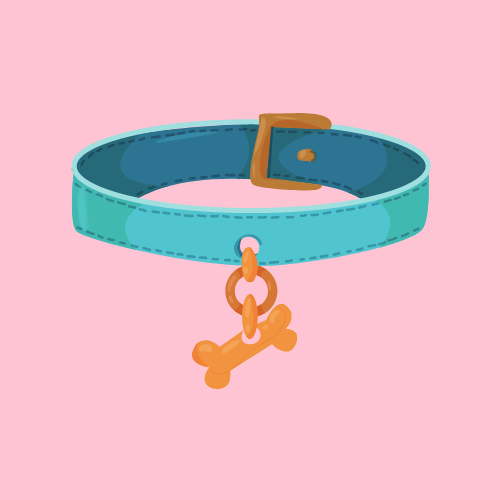Introduction
Dogs scratching their necks excessively is a common problem that many pet owners face. It can lead to discomfort, and pain, and even impact the dog’s quality of life. This article aims to provide a comprehensive understanding of why dogs scratch their necks until they bleed, the dangers of constant scratching, and how to prevent and manage this behavior. By providing helpful tips and advice, we hope to assist pet owners in identifying the root cause of the scratching behavior and providing appropriate treatment options, ultimately leading to a healthier and happier dog.

Understanding the Reasons Why Dogs Scratch Their Necks:
Scratching is a natural behavior in dogs, and it is their way of relieving an itch. However, when dogs scratch their necks excessively, it can lead to a range of issues. It is essential to understand the different reasons why dogs scratch their necks to identify the underlying cause and provide appropriate treatment.
Causes of Scratching Behavior:
There are several reasons why dogs scratch their necks. Some common causes include allergies, parasites, skin irritations, and underlying medical conditions. Allergies are one of the most common reasons for scratching behavior in dogs. Dogs can develop allergies to a range of things, including food, pollen, or environmental factors. Parasites such as fleas, ticks, and mites can also cause intense itching, leading to excessive scratching. Skin irritations, such as dry skin, hot spots, or bacterial infections, can also lead to scratching behavior. Lastly, underlying medical conditions, such as thyroid problems, autoimmune diseases, or cancer, can cause dogs to scratch their necks excessively.
Types of Itch That Dogs Experience:
It is important to note that not all itching is the same. Dogs can experience different types of itch, including pruritus and neuropathic itch. Pruritus is a general term used to describe itching, and it can be caused by several factors, including allergies, parasites, or skin infections. Neuropathic itch, on the other hand, is caused by damage to the nerves and can be more challenging to treat.
Medical Conditions That Contribute to Itchiness:
Several medical conditions can cause dogs to scratch their necks excessively. Some common conditions include atopic dermatitis, food allergies, and flea allergies. Atopic dermatitis is a chronic inflammatory skin disease that can cause itching and redness. Food allergies can cause dogs to itch, particularly around the face, ears, and paws. Flea allergies are caused by an allergic reaction to flea saliva, and even a single flea bite can cause intense itching.
Understanding the reasons why dogs scratch their necks until they bleed is crucial in identifying the underlying cause and providing appropriate treatment. By exploring the different causes of scratching behavior, the various types of itch that dogs experience, and the medical conditions that contribute to itchiness, pet owners can recognize the root cause of their dog’s scratching behavior and provide appropriate treatment options.
Understanding the Reasons Why Dogs Scratch Their Necks:
Scratching is a natural behavior in dogs, and it is their way of relieving an itch. However, when dogs scratch their necks excessively, it can lead to a range of issues. It is essential to understand the different reasons why dogs scratch their necks to identify the underlying cause and provide appropriate treatment.
Causes of Scratching Behavior:
There are several reasons why dogs scratch their necks. Some common causes include allergies, parasites, skin irritations, and underlying medical conditions. Allergies are one of the most common reasons for scratching behavior in dogs. Dogs can develop allergies to a range of things, including food, pollen, or environmental factors. Parasites such as fleas, ticks, and mites can also cause intense itching, leading to excessive scratching. Skin irritations, such as dry skin, hot spots, or bacterial infections, can also lead to scratching behavior. Lastly, underlying medical conditions, such as thyroid problems, autoimmune diseases, or cancer, can cause dogs to scratch their necks excessively.
Types of Itch That Dogs Experience:
It is important to note that not all itching is the same. Dogs can experience different types of itch, including pruritus and neuropathic itch. Pruritus is a general term used to describe itching, and it can be caused by several factors, including allergies, parasites, or skin infections. Neuropathic itch, on the other hand, is caused by damage to the nerves and can be more challenging to treat.
Medical Conditions That Contribute to Itchiness:
Several medical conditions can cause dogs to scratch their necks excessively. Some common conditions include atopic dermatitis, food allergies, and flea allergies. Atopic dermatitis is a chronic inflammatory skin disease that can cause itching and redness. Food allergies can cause dogs to itch, particularly around the face, ears, and paws. Flea allergies are caused by an allergic reaction to flea saliva, and even a single flea bite can cause intense itching.
Understanding the reasons why dogs scratch their necks until they bleed is crucial in identifying the underlying cause and providing appropriate treatment. By exploring the different causes of scratching behavior, the various types of itch that dogs experience, and the medical conditions that contribute to itchiness, pet owners can recognize the root cause of their dog’s scratching behavior and provide appropriate treatment options.
Preventing and Managing the Scratching Habit:
Preventing and managing the scratching habit is crucial to help alleviate discomfort and prevent further complications. There are several ways pet owners can prevent and manage their dog’s scratching behavior, including proper grooming techniques, using topical treatments, using a cone or collar, and changing the diet.
Proper Grooming Techniques:
Regular grooming is essential to maintain a healthy coat and skin in dogs. It can also help prevent itching and scratching behavior. Pet owners should bathe their dogs regularly using a mild shampoo and ensure that their fur is thoroughly dried. Regular brushing can also help remove any loose fur and dirt, preventing the buildup of bacteria and irritants on the skin.
Using Topical Treatments:
Pet owners can also use topical treatments to alleviate itching and prevent scratching behavior. Antihistamines, corticosteroids, and medicated shampoos can help reduce inflammation and soothe irritated skin. It is important to consult a veterinarian before using any topical treatments to ensure that they are safe and effective for the dog’s condition.
Using a Cone or Collar:
Using a cone or collar is another way to prevent scratching behavior in dogs. These devices can prevent the dog from accessing the affected area, allowing it to heal properly. However, it is essential to ensure that the cone or collar is the right size and that it does not cause discomfort or distress to the dog.
Changing the Diet:
In some cases, changing the dog’s diet can help alleviate itching and scratching behavior. Food allergies can cause itching and skin irritations, and identifying the allergen can help prevent further complications. Pet owners should consult a veterinarian to identify the underlying cause of the itching and determine the appropriate diet for their dog.
In conclusion, preventing and managing the scratching habit is essential to maintain the dog’s health and well-being. Pet owners can use several methods, including proper grooming techniques, using topical treatments, using a cone or collar, and changing the diet, to prevent and manage scratching behavior. However, it is important to consult a veterinarian to identify the underlying cause of the scratching behavior and provide appropriate treatment options.
The Role of the Owner in Addressing the Scratching Habit:
As a dog owner, it is crucial to understand the role you play in addressing the scratching habit. Early intervention, observation and monitoring, and regular check-ups with the veterinarian are vital to managing the condition and preventing further complications.
The Importance of Early Intervention:
Early intervention is critical in managing scratching behavior in dogs. Pet owners should be observant and address the issue as soon as they notice their dog scratching excessively. The longer the behavior persists, the greater the risk of secondary infections and the more difficult it may be to treat the underlying cause.
How to Observe and Monitor the Behavior:
Pet owners should observe and monitor their dog’s behavior regularly to identify any changes or patterns. This includes checking the dog’s skin for any signs of irritation, such as redness, bumps, or scabs, and monitoring the dog’s behavior for any signs of discomfort or distress. Keeping a journal or diary of the dog’s scratching behavior can also help identify any triggers or patterns.
The Importance of Regular Check-Ups With the Veterinarian:
Regular check-ups with the veterinarian are crucial in managing scratching behavior in dogs. The veterinarian can identify the underlying cause of the scratching behavior and provide appropriate treatment options. They can also advise on preventative measures and recommend any necessary lifestyle changes.
Alternative Treatments for the Scratching Habit
In addition to traditional treatments, there are also alternative treatments that pet owners can consider for managing scratching behavior in dogs. These alternative treatments include the use of natural remedies, acupuncture and massage therapy, and behavioral modification.
The Use of Natural Remedies:
Many natural remedies can help alleviate itching and scratching behavior in dogs. These remedies include coconut oil, oatmeal baths, and aloe vera. Coconut oil can be applied topically to soothe irritated skin, while oatmeal baths can help reduce inflammation and itching. Aloe vera can also be applied topically to soothe and moisturize the skin. However, it is important to consult a veterinarian before using any natural remedies to ensure that they are safe and effective for the dog’s condition.
Acupuncture and Massage Therapy:
Acupuncture and massage therapy are alternative treatments that can help alleviate itching and scratching behavior in dogs. Acupuncture involves the insertion of thin needles into specific points on the body to stimulate the nervous system and promote healing. Massage therapy can also help reduce stress and tension in dogs, which can contribute to scratching behavior.
Behavioral Modification:
Behavioral modification is another alternative treatment that can help manage scratching behavior in dogs. This involves identifying the triggers that cause the dog to scratch and modifying their behavior to prevent the behavior from occurring. This may include providing distractions such as toys or treats or modifying the dog’s environment to reduce stress and anxiety.
The Importance of Maintaining a Clean and Safe Environment:
Maintaining a clean and safe environment is crucial in managing scratching behavior in dogs. The environment can play a significant role in causing or exacerbating the behavior, and it is important to identify and eliminate any potential triggers.
The Role of Environmental Factors in the Scratching Habit:
Environmental factors, such as allergens, can contribute to itching and scratching behavior in dogs. Allergens such as pollen, dust, and mold can cause allergic reactions in dogs, leading to itching and skin irritations. Identifying the environmental factors that trigger the scratching behavior is crucial in managing the condition.
Identifying Potential Allergens:
Pet owners should identify potential allergens in the dog’s environment and take steps to eliminate them. This may include changing the dog’s diet, avoiding exposure to certain plants or environments, and keeping the dog’s environment clean and free of irritants.
Keeping the Environment Clean and Free of Irritants:
Keeping the environment clean and free of irritants is essential in managing scratching behavior in dogs. Pet owners should regularly clean their dog’s living areas, including their bedding and toys. Using non-toxic cleaning products and avoiding exposure to cigarette smoke, perfumes, and other irritants can also help reduce itching and scratching behavior.
Conclusion
In summary, scratching behavior in dogs is a common problem that can lead to discomfort, pain, and even affect the dog’s quality of life. This article has explored the different causes of scratching behavior, the impact it has on the dogs and their owners, and how to prevent and manage this behavior. It is crucial to understand the reasons why dogs scratch their necks, identify the underlying cause, and provide appropriate treatment options.
The importance of addressing the scratching habit cannot be overstated. Pet owners play a crucial role in managing the condition and preventing further complications. Early intervention, observation and monitoring, and regular check-ups with the veterinarian are essential in managing scratching behavior in dogs.
Ultimately, the benefits of a healthy, happy dog are immeasurable. By taking steps to prevent and manage scratching behavior, pet owners can create a healthy and happy environment for their furry friends. A healthy dog is not only happier but also more energetic, playful, and a joy to be around. It is therefore essential to prioritize the dog’s health and well-being and address any scratching behavior promptly.
FAQS:
What causes dogs to scratch their necks?
Dogs scratch their necks for several reasons, including allergies, parasites, skin irritations, and underlying medical conditions.
Is scratching a normal behavior for dogs?
Scratching is a natural behavior in dogs, but excessive scratching can be a sign of an underlying health issue and should be addressed promptly.
Can scratching lead to more serious health issues?
Yes, scratching can lead to more serious health issues, including hot spots, secondary infections, and psychological stress.
How can I help my dog stop scratching?
Pet owners can use several methods to help their dogs stop scratching, including proper grooming techniques, using topical treatments, using a cone or collar, changing the diet, and identifying potential triggers.
When should I take my dog to the vet for scratching?
Pet owners should take their dog to the vet if they notice any signs of excessive scratching or irritation, such as redness, bumps, or scabs, or if the scratching behavior persists.
Are there any home remedies for scratching?
There are several natural remedies that pet owners can consider for managing scratching behavior in dogs, including coconut oil, oatmeal baths, and aloe vera. However, it is important to consult a veterinarian before using any natural remedies to ensure that they are safe and effective for the dog’s condition.
Can scratching be a sign of a more serious medical condition?
Yes, scratching can be a sign of a more serious medical condition, such as atopic dermatitis, food allergies, or flea allergies. It is essential to identify the underlying cause of the scratching behavior and provide appropriate treatment options.

Doctor of Veterinary Medicine (D.V.M.) at Nation Taiwan University,Master of Science (M.S.) in Biomedical Engineering at National Taiwan University of Science and Technology




